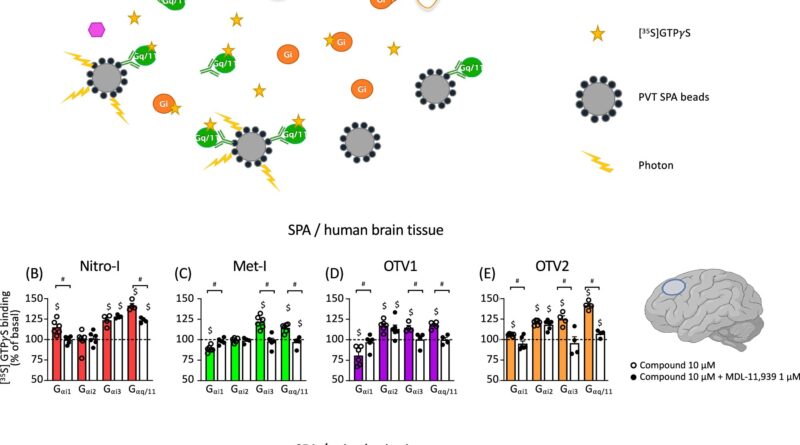New approaches to individualizing treatments for schizophrenia
Antibody-capture [35S]GTPγS binding scintillation proximity assay (SPA). Credit: Nature Communication (2024). DOI: 10.1038/s41467-024-48196-2
× shut up
Antibody-capture [35S]GTPγS binding scintillation proximity assay (SPA). Credit: Nature Communication (2024). DOI: 10.1038/s41467-024-48196-2
An international survey, published in Nature Communication, could help develop new personalized treatments for people diagnosed with schizophrenia. These are patients with a variety of symptoms, such as delusions, hallucinations, cognitive impairment, memory or language impairment, and depressive symptoms.
Current treatments, especially those that focus on specific treatment, the type 2A serotonin receptor, do not allow to take action that determines the symptoms that the patient has, causing side effects, and metabolic problems or of a car, among others, leading to abandonment.
In this context, the study showed the role of certain proteins, G proteins, which play an important role in regulating cell responses in schizophrenia. In particular, it was shown that two types of these proteins allow the modification of the main symptoms of this disease.
The research was led by the Medical Research Center of the Hospital del Mar, collaborating with researchers from the Neuropsychopharmacology Group of the University of the Basque Country (UPV / EHU) and researchers from the CIBER of Mental Health (CIBERSAM).
Dr. Jana Selent, one of the lead authors of the study and coordinator of the Drug Discovery Group based on G protein-coupled receptors at the Medical Research Center of Hospital del Mar, says, “These proteins are coupled to the fluid alone, but do not work in the same way, causing different reactions in the cells, which gives us very important information for future studies that will lead to the development of drugs for the treatment of schizophrenia personalized, tailored to each patient’s symptoms.
Advanced complex learning
To reach these conclusions, researchers had to conduct complex research. The first step was to select different molecules available, although not approved drugs for humans, to analyze them at the molecular level and through simulations at the atomic level, their ability to interact with type 2A serotonin receptor. This allowed the selection of four compounds, which began to be studied in cells, where it was shown that when binding the liquid, it produced responses with different types of G proteins.
These results were used in the analysis of human brain tissue samples from the collection of the Neuropsychopharmacology Group of the University of the Basque Country (UPV/EHU). In these studies, it was observed that “chemicals have a very different effect on G proteins: some activated them, but others inhibited them,” explains Dr . Patricia Robledo, who is also the lead author of the study and researcher in Integrated Pharmacology and. Systems Neuroscience Group.
In this regard, “the possibility of inhibiting the coupling of the serotonin 2A receptor to certain G proteins has been presented as an area of interest for the creation of a new class of drugs, known as different agonists, as tools which may exist against psychological conditions,” it says. Rebeca Diez-Alarcia, first co-author of the article and researcher at UPV/EHU.
Furthermore, in a mouse model designed to mimic the symptoms of schizophrenia, these compounds had unique behavioral effects depending on which G protein they activated. Therefore, using pharmacological and genetic methods in mice, it was found that one of these G proteins is involved in symptoms related to psychosis, and another type of G protein with cognitive deficits .
Dr. Robledo says, “This is the first time that promising therapeutic targets have been found for the development of drugs that work and benefit a specific condition of schizophrenia patients.”
Although the compounds used in the study have not been approved as drugs for human use, Dr. Jana Selent says “this multidisciplinary work reveals the blueprint for the chemical design of future drugs that work in specific ways to treat schizophrenia, avoiding related ways. with side-effects later, which is very important for personalized treatment.”
Dr. Daniel Berge, a psychiatrist at the Mental Health Hospital, who did not participate in this work, points out that “this research will help to make special drugs for the treatment of schizophrenia, which can provide better tolerance and beyond the symptoms of the disease, all of this can promote better adherence to treatment, which is key to preventing relapse and achieving a better quality of life.
Additional information:
Elk Kossatz et al, G protein-specific mechanisms at the serotonin 5-HT2A receptor regulate psychosis-related outcomes and memory deficits, Nature Communication (2024). DOI: 10.1038/s41467-024-48196-2
Newspaper articles:
Nature Communication
Provided by IMIM (Hospital del Mar Medical Research Institute)
#approaches #individualizing #treatments #schizophrenia
